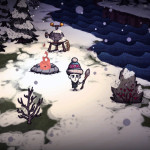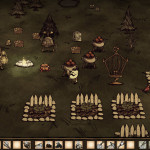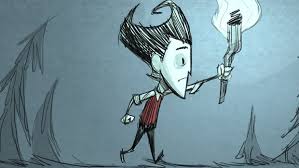Don’t Starve: A Lesson in Ecology and Survival
by Phoenix, HSM team writer
Don’t Starve is not a survival horror game in the sense that you must fight and beat back hordes of zombies or virus-infected multitudes of vampires or werewolves. In this game — available on PS4, Mac, PC and Linux — you must survive the elements, nature and your own insanity in the wilds of randomly-generated worlds, getting by solely with your wits and what little resources you can scrape together.
Recently I had the opportunity to play the PS4 game Don’t Starve. This game caught my initial interest because it reminded me of Harvest Moon, in that you must at some point find food and survive from day to day or you will become ill and die. As you move through the game you will find the automatic day/night cycle (another similarity), as well as your hunger, come faster than you would like in the beginning, leaving very little time to hunt for supplies before night falls. In addition, you must keep a fire burning to keep back what creatures are lurking in the dark, before they attack and possibly kill you.
Some other similarities with Harvest Moon are in the environment, your impact on it, and the activities you must perform. That said, the similarities stop there; in Don’t Starve you are alone, expect for a village of pig men and wild beasts that can — and will — often kill and devour you. The most important difference is death in this game: it is permanent. There is  no save file to start up upon dying. You start all over, with nothing.
no save file to start up upon dying. You start all over, with nothing.
When I played the game I didn’t forage far and wide in my search. I set my basecamp up as quickly as I could. I continued to survive the night and wander around the next day, doing much the same. My wandering days were over — or so I thought. I chopped down trees, harvested berries and carrots, pulled grass and saplings in and around my campsite.
I quickly found I starved to death in a matter of days. Once I wandered around my campsite in search of all the materials I needed to create the longer-lasting items, not to mention feed myself, I had used up all the resources. I had to wait for the trees, saplings, berries and grass to re-spawn near base camp — and they don’t do so right away. In order to keep from starving, I had to move on a regular basis, further and further away, setting up temporary camps wherever nightfall caught me, with no real sense of any purpose other than to find food. Using up the wood I had gathered for campfires every night and eating everything I found.
Though the impact on the environment is short term in both games, there is something to be said about games that make us mindful of the environment and sustainability. Don’t Starve is one of these games. These games have an ecological balance to maintain if we are to advance through the levels. If you hunt and kill, forage and denude your ecosystem,  you will reap the hazards of that in spades. You will most likely die — a lot — unless you have created chests for storage (and hording can cause loss as well, as your food can rot before you eat it). Don’t Starve teaches an ecology lesson, even if you didn’t notice it in your gameplay.
you will reap the hazards of that in spades. You will most likely die — a lot — unless you have created chests for storage (and hording can cause loss as well, as your food can rot before you eat it). Don’t Starve teaches an ecology lesson, even if you didn’t notice it in your gameplay.
As you advance in number of days alive, you are forced to become self-sufficient by building, sometimes storing and maintaining a farm so that you will not starve or be forced to be a nomad. Your character lives off the land and must be mindful of the effect it has on the land, and how you play the game has a big impact on your survival. As an ecology enthusiast in real life, I enjoy these interactive worlds. I like a game that gives the player the opportunity to impact their environment, even if it isn’t long-term like some games have it.
I don’t know that Klei Entertainment had this in mind for their game, but it’s a pleasant discovery. In a game-generated world where there are few if any instructions, the player’s mode of personal and moral code has a great deal to do with survival here. Over-hunting, fishing, harvesting of plants and consumables, etc. can have devastating consequences: a lesson for the real world as well. Don’t Starve offers hours of interesting true survival gameplay; living off the land. It may not seem so, but it offers hours of decision making, too, along with the constantly evolving experience of a unique survival game.
Playing this game might give you pause for consideration of our real ecosystems and our continued survival. Highly recommended.
Share
| Tweet |


